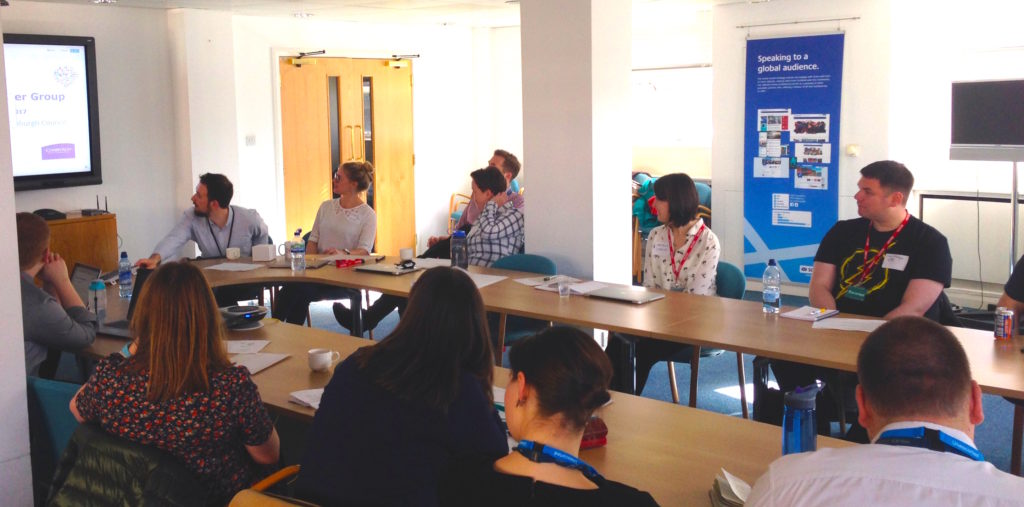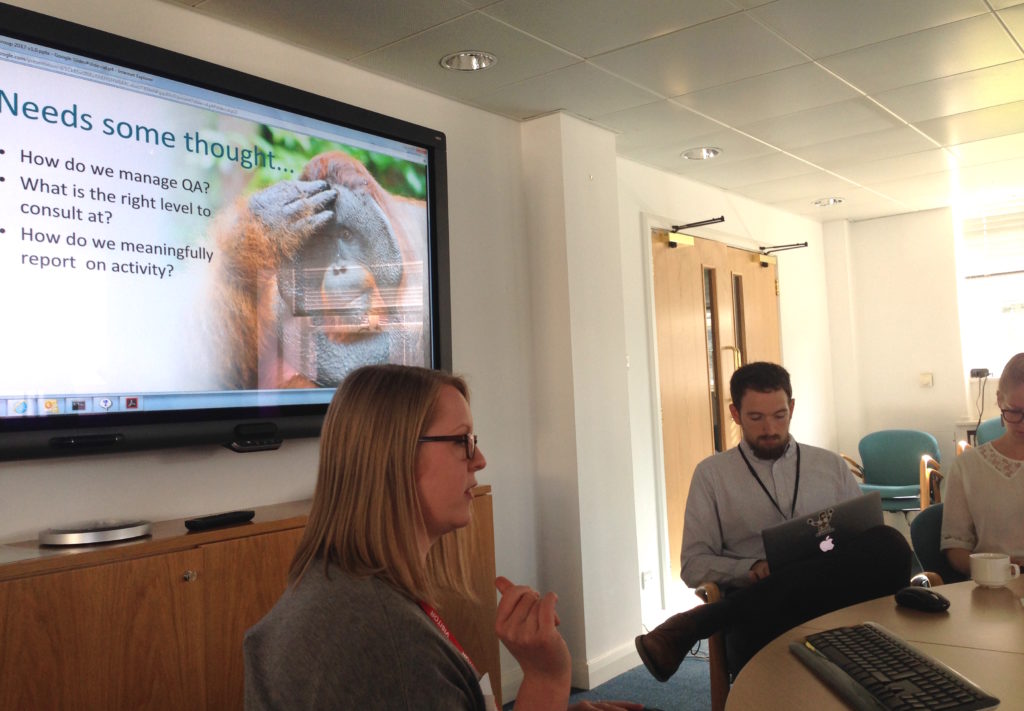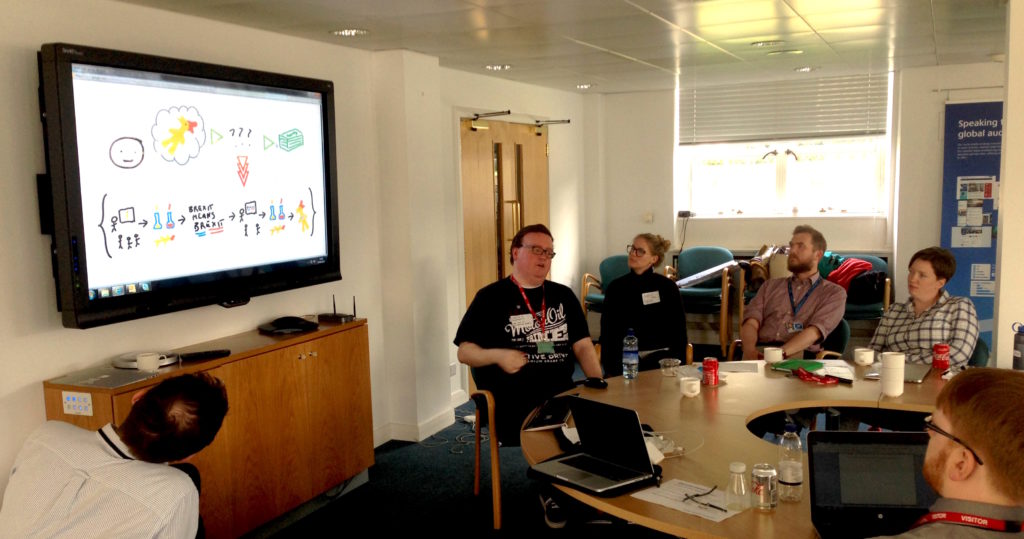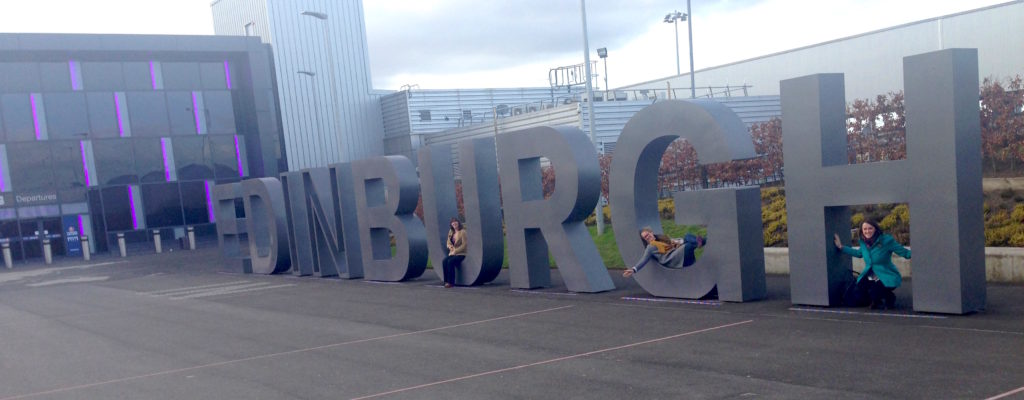We kicked off our 2017 user groups in a sunny and spring-like Edinburgh this week. Hosted in collaboration with the Scottish Government (special thanks to the Digital Engagement team!), the day involved a fantastic array of speakers and lots of discussion. The user groups are a regular opportunity for customers to catch up, to see how others in similar roles are using their platforms to manage their online consultation and engagement activity, and hopefully to pick up some interesting tips and insights.

So, for the benefit of those who weren’t at the event, we’ve a quick round-up of 10 things we wish you could’ve been there to hear. Without further ado:
1. Make time to consider the ‘total value’ of a consultation activity
During the morning session, we discussed what success looks like for online consultation. One of the topics that came up was considering the ‘total value’ of consultation activity – i.e. looking beyond just the number of responses. They may be less easy to track and measure but factors like the amount of time a citizen – or the organisation, for that matter – spends on a consultation, or the cost of the issues at hand, can give a richer evaluation of an exercise.
“Do the individuals who have been consulted feel that they have been considered?”
Eachann Gillies, Digital Engagement Manager, The Scottish Government
2. Citizen Space helps organisations run an end-to end process
Police Scotland gave a fantastic and candid presentation reflecting back on their first couple of months of using Citizen Space. Prior to using the tool, reporting and results from consultation exercises weren’t always well-integrated (for example, surveys and the feedback on those surveys would often be on entirely separate sites). Now, using Citizen Space, it’s possible for the organisation to create, analyse and report back on the consultation all in one place. 
3. Effective promotion is key
Police Scotland also talked about effective promotion. In order to ensure their consultation was a success, they drew up a timetable of thematic weeks of engagement which helped with their overall vision of getting to much-talked-about but hard-to-reach communities. During the process, they even used the admin side of Citizen Space to report back internally on the effectiveness of their outreach activity. (It’s always great to hear about people finding new and creative ways to use our platforms!)
4. Make reporting meaningful

There was general recognition that, sometimes, what is useful and meaningful to a chief exec might not be what citizens are looking for when it comes to reporting. We also talked about how the success of a consultation is not necessarily about big numbers (especially not if they become ‘vanity metrics’) – it should be about the substantive changes under consideration and their implementation. Reporting needs to be tailored to its intended audience, but should always focus on meaningful findings and actions (not telling people what you think they want to hear).
5. Trust your community managers and enable them to make decisions ‘on the fly’
If a community manager needs to go away and check that a post is OK before approving it, it can kill the flow of the conversation. Ensuring that they are well equipped and trusted in their role is key. If there is more than one person moderating ensuring they are in agreement on what can and can’t be moderated out is of paramount importance for quality control.
“What a beautiful thing to have these conversations in the open”
(Leah Lockhart, DemSoc)
6. Create welcoming online spaces
Online conversations are happening right now; government departments can choose to listen and be involved in them – which means offering a welcoming space. There was unanimous agreement that if you don’t give people the space to have their say, they’ll end up expressing their views somewhere else anyway. The conversation is going to be happening whether you as an organisation are listening or not – so better to be actively engaging!
7. Think carefully about scale
Sometimes going online and asking ‘huge’ questions about a topic isn’t as useful as taking ‘bite-sized’ chunks and breaking them down into digestible consultations or chapters. Something smaller and interactive might be more useful in the long run than asking broad questions.
8. We’re seeing a move towards ‘continuous democracy’
Whilst discussing trends in digital democracy in Scotland, Ali from The Democratic Society noted how we’ve started to see a move away from one-off engagement initiatives towards more ‘continuous democracy’. That is to say, involving citizens and stakeholders in decisions is increasingly part of business as usual – a default expectation of democratic organisations.
As a result, it has become more important to establish and refine the processes by which this continuous democracy operates. Rather than reinventing the wheel in a haphazard series of ‘one-hit wonder’ projects, consistency is key: repeatability, standardisation etc all make it easier to effectively involve people on a daily basis.

9. Analysis needs planning
Getting the right results for analysis stems from asking the right questions. For colleagues in policy teams, how can we make sure effective analysis is borne in mind – especially at the early/planning stages of a new policy or decision?
““Running a consultation and not thinking about analysis before you start is like getting in a car without knowing where you’re going””
Eachann Gillies, Digital Engagement Manager, The Scottish Government
10. Context is king
It needs to be easy for respondents to participate (people’s time is precious, after all). Small details to reduce the ‘friction’ of consultative processes can make a big difference. For example, The Scottish Government have had some really positive feedback from respondents on their practice of using carefully-placed ‘fact banks’ in their surveys – giving contextual detail/background information immediately alongside each question. This helps people give informed responses, which in turn hopefully leads to better decisions in policy-making.
As ever, big thanks to everyone who attended and for the customers who agreed to speak at the event. We hope you enjoyed the user group as much as we did – and if you didn’t have time to attend, don’t fret! We’ll most certainly be holding more user groups in 2017 (In 2016, we ran no fewer than 5 user groups around the world: kicking off in Scotland before heading to Australia and back to London.) Up next this year is our first user group in Belfast – on May 10th.
Until next time, Edinburgh 😉
